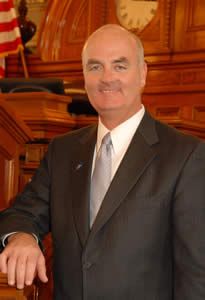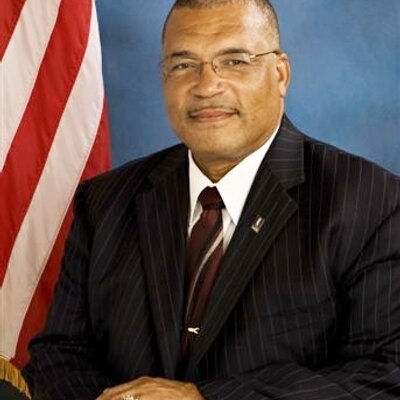Stepping Up for the Fourth
With the news of Rep. Mike Pompeo’s nomination
for CIA chief, Kansas’ Fourth congressional district will suddenly be vacant.
Considering Pompeo will almost surely be confirmed, state laws call for a special
election to be held, for which party conventions select candidates. Kansas’
last US House special election occurred
in 1950, setting up 2017’s race as an exciting prospect for avid politicos.
 |
| Kansas' 4th District |
On the Republican side, numerous
figures have discussed running. Former Representative Todd Tiahrt, who
represented the region from 1994 until an ill-fated senate bid in 2010, has
already confirmed
his potential interest. However, there are certainly questions about
Tiahrt’s chances of making it through a contested convention. After all, his primary
campaign against Mike Pompeo in 2014 ended badly, with Tiahrt losing
to Pompeo by a whopping 26-point margin. During that cycle, Tiahrt ran a strange
underdog campaign, positioning himself towards the center on some issues
like campaign finance reform, taking Libertarian stances on others like NSA surveillance,
and trying to outflank Pompeo to the right on Obamacare. This curious mix
combined with relatively weak fundraising to hand him a decisive, crushing loss
despite his high name recognition. With this loss in mind though, perhaps
Tiahrt will face an uphill battle to win over the district’s Republicans,
especially those loyal to Mike Pompeo’s faction.
Another major Republican all but
expected to run is State Treasurer Ron Estes, who has a website where voters can declare
support for a campaign. The groundwork is there, and unlike many state-level
Republicans, Estes has avoided controversy pertaining to the Brownback
administration and its brutally failed economic experiment. In fact, he has at
times challenged
Brownback on ideas like pension cuts, which Estes opposed. Moreover, Estes
served two
terms as Sedgwick County treasurer, which may hold some sway in the Fourth,
which is dominated politically by Sedgwick County. Estes’ relatively
uncontroversial record makes him a GOP convention frontrunner. However, he
lacks the conservative credentials some Republican contenders could bring to
the table. In a convention setting dominated by party activists, this may end
up counting for a lot.
Numerous
other names have been floated as potential GOP candidates. One big name is Alan
Cobb, former Koch Industries lobbyist and Donald Trump’s national
coalitions director. Experienced and with ties to the Koch empire, he would
have no trouble raising money and would be popular at a convention. However, in
a general election with a strong Democratic campaign, his lobbyist connections
could prove to be a weak point. Additionally, some have positied that former congressman Tim Huelskamp might jump into the race, despite his loss to Roger Marshall in the 2016 primary election. With his combative nature, perceived carpetbagging, and extremism, Huelskamp would be wonderful for Democrats. Another name mentioned in the fray
is county-commissioner elect Michael O’Donnell, easily one of the more
controversial politicians Kansas has ever seen. In the swamp, O’Donnell would
be the kingpin of the rats. From buying alcohol for
minors to controversy
over paying taxes to running a sleazy,
inaccurate campaign against respected commissioner Tim Norton, O’Donnell is
the epitome of everything wrong with politics as usual. Add to his record a
high degree of support
for Brownback's agenda, and Democrats would do well to field a strong
candidate in this race.
That brings me to the focal point of
this article-which Democrats would be good candidates for the special election.
Charismatic, policy-focused Wichita lawyer Dan Giroux, who ran a solid campaign
but fell victim to the Hillary effect and an independent candidate, decided
not to run in 2017, leaving Democrats scrambling to find a solid candidate
for what is likely to be a low-turnout runoff election. A number of names have been
mentioned as potential Democratic candidates, and most are seriously
impressive. KMUW lists the potential
contenders here. The names mentioned are: State House Minority Leader Jim
Ward, State Rep. Henry Helgerson, former Wichita Mayor Carl Brewer, former
State Treasurer Dennis McKinney, and businesswoman Laura Lombard, along with
Robert Tillman. Only two candidates have declared, Lombard and Tillman. Some
contenders are stronger than others, which is why it’s important to break down
strengths and weaknesses.
 |
| State Rep. Jim Ward |
 |
| Former Wichita Mayor Carl Brewer |
The third major contender I’ll focus on is former state treasurer Dennis McKinney. As the only candidate in the mix from outside of Wichita, he brings a different perspective and background to the table. McKinney has private sector, municipal, legislative, and executive experience, as a farmer, having served as a Kiowa
County Commissioner for 3 years, a state representative for 18 years (including
5 as minority leader), and state treasurer for 2 years, he knows what it means
to be a true public servant. Perhaps the most remarkable thing about his tenure
serving the 116th district is just how conservative the area is.
With the boundaries he most recently served in, only
20% of voters in the 116th were registered Democrats, compared to
58% who were registered Republicans. McKinney ran populist campaigns and proved
able to fundraise and get his message out. Retail politics was clearly a strong
suit, as shown by his performance in his district. After surviving
the Greensburg Tornado, McKinney was one of the strongest forces behind the
town’s successful rebuilding efforts, cementing his reputation as a leader.
While he hasn’t been in elected office since losing
his treasurer re-election bid to Ron Estes 58%-41% in 2010, that race
remains important to look at. In a GOP wave year, where Kansas lost its last
Democratic congressman and took blows statewide, Dennis McKinney performed well
in rural areas. During that race (owing in part to his tenure as a state rep),
he won 82% in Kiowa County, 69% in Pratt County, 69% in Comanche County, and
64% in Barber County, along with good margins in other Southwest Kansas
counties. In those same counties, respectively, this year Hillary Clinton garnered
11%, 20%, 12%, and 13%. McKinney’s strength in rural Kansas could be seen
elsewhere. In Ellis County (Hays), he pulled 42% of the vote (Hillary: 23%). In
Marion, he got 43% (Hillary: 22%). In deep red Wallace County, he got 36%
(Hillary: 6%). Even in Sedgwick County, running against the popular county
treasurer in a lower turnout midterm, McKinney won 35% of the vote (Hillary:
37%). Dennis McKinney can boost Democratic strength all across the Fourth District and make inroads into areas that
have lacked outreach in recent years. This can not only help propel McKinney to
victory, but also lay the groundwork for Democratic success and organization
for years to come. When rural counties receive more attention and resources from Democrats, the ticket does better and more Kansans' interests are represented. I would be especially interested to see a McKinney-Huelskamp race, considering Huelskamp's alienation of farm interests and McKinney's farm background. Nonetheless, McKinney would be a stellar candidate to go toe to
toe with any of the aforementioned Republicans.
 |
| Former State Treasurer Dennis McKinney |
Some of the other candidates also
have impressive qualities. Henry
Helgerson returned to the state legislature to represent East-Central
Wichita after a hiatus and has immense private sector experience after having
served as a state representative for 17 years and a state senator for 2 years.
I will be honest-I didn’t know much about Rep. Helgerson. He would probably be
a good candidate too.
Entrepreneur Laura Lombard is definitely the most qualified candidate
on foreign policy issues out of this bunch. She is the President and Executive
Director of the Middle East & North Africa Consultants Association, which
works to promote global business linkages. This impressive position is
accompanied by a wealth of knowledge about foreign policy, which is sorely
needed in congress. Lombard already seems to be fundraising, albeit through gofundme, which
seems interesting. She has raised $2,725 in 10 days without creating much
fanfare or garnering a large degree of attention. If Lombard can build name
recognition and prove to be a good fundraiser, her private sector and policy-related
experience will be major assets.
The other declared candidate is
Robert Tillman, who was the Democrats’ 2012 candidate after being defeated in
the 2010 primary and lost another primary in 2016. Tillman’s reasons
for running in 2012 were highlighted by mundane statements such as “I am
running for Congress because my wife wants me to get a job”, “I want to know if
I am the ‘chosen one’”, and “I'm running to learn more about how the United
States Government works”. He does not have a website (for his failed 2016
campaign) or any campaign apparatus aside from his bright yellow “Vote Tillman”
t-shirt. Clearly, with the aforementioned Republican vulnerabilities, Democrats
need to find a serious candidate to
run against any Republican.
I believe that the three strongest candidates
for the Democrats in the Fourth District are Jim Ward, Carl Brewer, and Dennis
McKinney. While some of the others are promising, these three have the best
shot at pulling off a win. On a purely personal level, I like all three, but
gravitate towards Dennis McKinney. I really admire and look up to Rep. Ward,
but I want to see him give his full attention to fighting Right Wing extremists
in the Kansas House. Carl Brewer would be a fantastic
candidate, but I personally prefer the more populist Dennis McKinney. He has important
experience winning outside Wichita and has proven that he can swing Republicans
to vote Democratic. Democrats have an opportunity coming up. Here’s to a strong
campaign and a Democratic win in the Fourth District!
